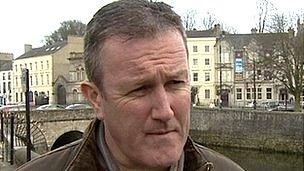Conor Murphy rejects NI Water tribunal findings
- Published

Conor Murphy said he absolutely refuted the findings of the tribunal
Former regional development minister Conor Murphy has said he "absolutely refutes" the findings of an industrial tribunal which criticised him.
The tribunal found that Alan Lennon, a Protestant, was overlooked for the post of chairman of Northern Ireland Water because of his religion.
It found that evidence by the then minister Mr Murphy was "implausible and lacking credibility".
Mr Murphy said he did not think he had anything to apologise for.
There were five candidates for the job, with the only Catholic, Sean Hogan, securing the post in March 2011.
The decision to appoint him was Mr Murphy's.
The former minister said he would talk to the lawyers who represented the DRD at the tribunal with the view to appealing against the decision.
"This particular appointment was audited by the appointments commissioner who found that it was properly adhered to," Mr Murphy said.
"You have the responsibility as a minister to make that appointment, you also have the responsibility when you make that appointment to stand up in front of the assembly and to answer for that appointment.
"So judging against the criteria that's been put in front of you and not introducing any other criteria, you have to make a judgement weighing up the advantages or disadvantages of each of the five candidates against that criteria and that involves a subjective judgement
"That's what I did - I came to my judgement and I'm satisfied it was the right judgement and I stand over it and I refute absolutely that I made it on any other basis other than merit."
'Major ramifications'
However, Mr Lennon said people "now understand the potential abuse" in the system.
He said the case would have "major ramifications" for the way the civil service and ministers approached public appointments.
"Most members of the public would expect that, in an interview process, an expert panel would rank people and top of the ranking the best person for the job would be offered the job. But that's not how it happens in DRD," he said.
"The tribunal has criticised the use of unranked lists really as a charter for cronyism, should ministers choose to use it in that way."
The tribunal believed Mr Murphy broke the code of practice for appointments.

The case was brought by Alan Lennon
According to the tribunal, Mr Hogan was selected because "he was not from a Protestant background and because he was known to the minister and his (then Sinn Fein) ministerial colleagues", Michelle Gildernew and Caitriona Ruane, who were consulted about the appointment.
It also said Mr Murphy had added new criteria to the selection process "in order to secure Mr Hogan's appointment".
Mr Lennon said he had made the complaint after meeting a "brick wall" when he had asked for feedback about why he did not get the job, as he felt he was well qualified.
"They didn't answer my questions and it got to the point where I either gave up completely or the only way I was going to get any additional information was to go to the office of the tribunal," he said.
"I felt I didn't just want to back down and be pushed away."
'Public confidence'
The DUP's Gregory Campbell said Sean Hogan should step down from the NI Water post in light of the tribunal findings, a call echoed by Ulster Unionist leader Mike Nesbitt.
Mr Nesbitt also called for a ruling on whether Mr Murphy had broken the MLA code of conduct and whether he breached the ministerial code.
"It is vital that these steps are taken to restore public confidence in ministerial appointments," he said.
The SDLP has called for an independent inquiry into all appointments and dismissals by NI Water during Mr Murphy's time as regional development minister.
"The finding of this industrial tribunal is disturbing and by necessity will have serious repercussions beyond this one incident," assembly member John Dallat said.
Mr Lennon's case was assisted by the Equality Commission.
Its chief executive Evelyn Collins said: "We supported this case because it is our view that the standards of fairness and non-discrimination that we expect in employment situations should apply equally to all public appointments.
"A key part of this is the requirement for a sufficient degree of transparency and accountability in the process to assure people that selection is based on merit and that, if unlawful discrimination occurs, it can be challenged."
The DRD said it would take time to consider the ruling.
- Published20 June 2012